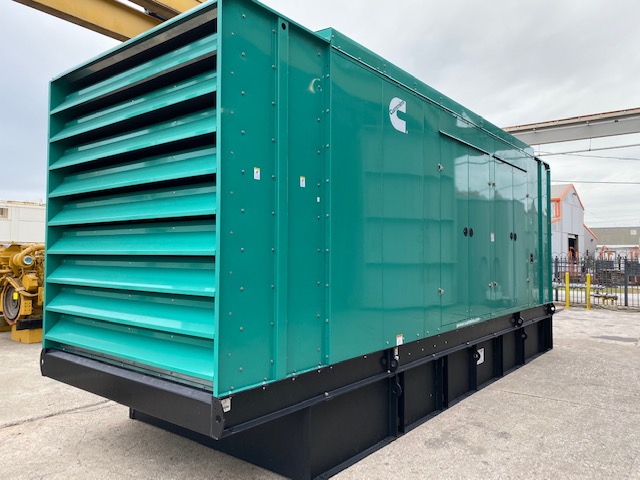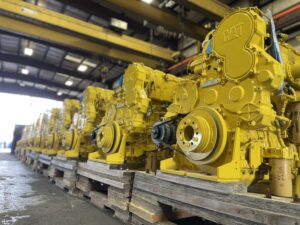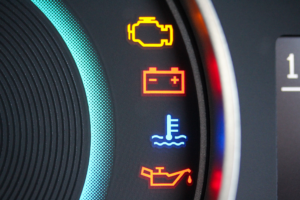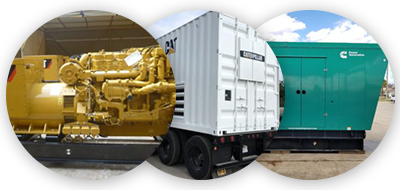
The country is digging out from one of the harshest winters we’ve seen in years. Massive snow and ice storms knocked out power in many areas – sometimes for hours, but often for days. Did your business experience lost power – and profits?
A commercial generator will protect your building as well as your bottom line. No matter the product or service your business provides, stable commercial electricity is your lifeblood. You and your employees depend on it being there.
The ROI for a commercial generator could be huge, given the alternative of lost power (and profits) from a storm, fire, natural disaster – or even from utility line maintenance or human error.
Use this generator buying guide to help you pick the right model that best suits your business’s needs.
But, first…
How Is a Commercial Generator Different Than a Home Generator?
The biggest differences between a generator built for commercial or industrial use and one designed for home application are physical size, capacity, ruggedness, features like automatic operation and voltage regulation, and of course – cost.
- Home generators:
- Generally used as backup or standby power with light-to-moderate wattage demands
- Smaller in size and usually portable
- Not designed to run continuously for long periods of time
- Usually not connected for automatic switchover in event of power loss
- Commercial generators (when intended as main backup power):
- Larger size, stationary, and cost much more
- Designed and connected to start and stop automatically
- Provide full and continuous power until primary power is restored
- Built to handle much higher wattage demands and higher heat associated with a continuous indefinite operation
- Internal components are more rugged
- The engine is larger. usually liquid-cooled, and there are more fuel options available
- Have automatic voltage regulation feature
- Monitors and prevents surges and dips in input voltage that can damage equipment or interrupt operation
So, with those differences in mind – how do you buy the right commercial generator to ensure that your business stays up and running in an emergency?
Commercial Generator Buying Guide
Most Important – Determine Capacity Needed
The most important factor in buying the right generator is determining how much power your business needs to conduct normal business operations. Calculating wattage you require to keep running is key to determining generator capacity.
If you have a small business and only require power for office lights, computers, printers, copiers, etc, your demand level is much lower than a factory or other industrial facility with large machinery that must remain continually operating.
Underestimating your power needs can not only cause unwanted disruptions or work stoppages but can also damage equipment. Either case costs you money.
So, the best advice is to err on the side of caution when calculating power needs.
A good source to aid your calculation of wattage requirements is your business’s electric bills over the past 12 months. You should review them thoroughly.
If it’s listed on your monthly statement, check out your peak demand over the past year. Note the highest wattage used in any month, then increase it by 25% to give you some reserve. That should your baseline wattage when you shop.
We recommend you also get a professional opinion before you commit a significant sum of cash to buy a generator.
A knowledgeable electrician or an experienced generator dealer like Depco can you confirm your decision based on all the available data.
Consider Impacts of Voltage Dips
Most commercial generators are designed with automatic voltage regulation. That feature “levels out” surges and drops that may occur in input voltage when the generator is running, often due to starting or stopping of electrical motors.
The equipment that your business operates has varying tolerances for input voltage dips. The OEM specification sheets or manuals for the equipment and machines you run should list input voltage requirements.
They’re usually listed as the nominal amount plus/minus a certain number (e.g., 115 VAC +/- 5 V). Your generator needs to be large enough to handle the maximum allowable voltage drop.
Location and Environmental Factors
Your generator is designed with certain guidelines about environmental factors that affect airflow to the engine and heat dissipation. Such factors as altitude, ambient temperature, humidity, and even proximity to your building may affect generator performance at times.
In the event that the generator is operating outside its design specs, it may experience degraded power output. Just be aware of that possibility.
But it’s preferable to locate the generator as close as possible to the electrical wiring coming into your building. Part of the installation will include one or more automatic transfer switches to handle switchover from utility to generator power.
Engine Fuel Options
- Diesel Fuel
- Most popular type
- Most efficient type for capacity over 150 kilowatts
- Low-cost maintenance and long engine life
- Runs in winter conditions with simple additives
- Can be stored onsite for up to 24 months
- Gasoline
- Affordable
- Usually readily available – except in emergencies with high demand
- Highly flammable if stored onsite, and only good for up to 12 months
- Natural Gas
- The biggest factor is whether your business has a natural gas line available
- No need to store fuel onsite if a gas line is there
- Impervious to ambient temperature
- Propane
- Storage time is unlimited
- Cost prohibitive for larger businesses (both initial fuel cost and storage)
- Clean-burning and quiet
- Dual Fuel (Diesel and Natural Gas)
- Good option due to having a backup source of fuel
- Higher generator cost
Noise Level And Vibration
All generators make noise and vibrate to some extent. The primary source of noise is the exhaust, which can be reduced (but not eliminated) by a high-quality muffler. A generator enclosure to contain the noise is possible, albeit expensive.
Your business’s location (e.g., industrial area or mostly residential area) and also the location where the generator will be placed (e.g., inside or outside of your building) must be considered. Noise ordinances could be a factor.
Where Is the Best Place to Buy a Commercial Generator?
We hope the tips in this generator buying guide have been helpful.
At Depco Power Systems, we have been offering high-quality products and service at a fair price for over 20 years. We buy and sell new, used, and rebuilt equipment from the most trusted brands in the business, at a range of prices to suit any budget.
Contact us today and let us help you make the right commercial generator decision for your business. Your livelihood could depend on it one day soon!






